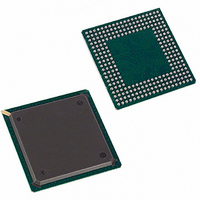DS3112+W Maxim Integrated Products, DS3112+W Datasheet - Page 23

DS3112+W
Manufacturer Part Number
DS3112+W
Description
IC MUX T3/E3 3.3V 256-PBGA
Manufacturer
Maxim Integrated Products
Datasheet
1.DS3112.pdf
(133 pages)
Specifications of DS3112+W
Controller Type
Framer, Multiplexer
Interface
Parallel/Serial
Voltage - Supply
3.135 V ~ 3.465 V
Current - Supply
150mA
Operating Temperature
0°C ~ 70°C
Mounting Type
Surface Mount
Package / Case
256-PBGA
Lead Free Status / RoHS Status
Lead free / RoHS Compliant
- Current page: 23 of 133
- Download datasheet (3Mb)
2.4 T3/E3 Transmit Formatter Signal Description
Signal Name:
Signal Description:
Signal Type:
This signal can be configured via the FTSOFC control bit in Master Control Register 1 to be either an
output or an input. When this signal is an output, it pulses for one FTCLK period to indicate a T3 or E3
frame boundary
boundary
Register 3 (Section 4.2) to be either active high (normal mode) or active low (inverted mode).
Signal Name:
Signal Description:
Signal Type:
An accurate T3 (44.736MHz ±20ppm) or E3 (34.368MHz ±20ppm) clock should be applied at this signal.
This signal is used to clock data into the transmit T3/E3 formatter. Transmit data can be clocked into the
device either on a rising edge (normal mode) or a falling edge (inverted mode). This option is controlled
via the FTCLKI control bit in Master Control Register 3 (Section 4.2).
Signal Name:
Signal Description:
Signal Type:
This signal inputs data into the transmit T3/E3 formatter. This signal can be sampled either on the rising
edge of FTCLK (normal mode) or the falling edge of FTCLK (inverted mode). This option is controlled
via the FTCLKI control bit in Master Control Register 3 (Section 4.2). Also, the data input to this signal
can be internally inverted if enabled via the FTDI control bit in Master Control Register 3 (Section 4.2).
When T3 C-Bit Parity Mode is disabled, C Bits are sampled at this input. This signal is ignored when the
M13/E13 multiplexer is enabled. (See the UNCHEN control bit in Master Control Register 1.) If not
used, this signal should be tied low.
Signal Name:
Signal Description:
Signal Type:
Via the DENMS control bit in Master Control Register 1, this signal can be configured to either output a
data enable or a gapped clock. In the data enable mode, this signal will go active when payload data
should be made available at the FTD input. In the gapped clock mode, this signal will act as a demand
clock for the FTD input and it will transition for each bit of payload data needed at the FTD input and it
will be suppressed when the transmit formatter inserts overhead data and hence no data is needed at the
FTD input. In the T3 Mode, overhead data is defined as the M Bits, F Bits, C Bits, X Bits, and P Bits. In
the E3 Mode, overhead data is defined as the FAS word, RAI Bit and Sn Bit (i.e., bits 1 to 12). See
Figure 2-2
Master Control Register 3 (Section 4.2). This signal operates in the same manner even when the device is
configured in the Transmit Pass Through mode (see the TPT control bit in the T3/E3 Control Register).
(Figure
for an example. This signal can be internally inverted if enabled via the FTDENI control bit in
(Figure
2-2). This signal can be configured via the FTSOFI control bit in Master Control
FTSOF
T3/E3 Transmit Formatter Start Of Frame Sync Signal
Output/Input
FTCLK
T3/E3 Transmit Formatter Clock
Input
FTD
T3/E3 Transmit Formatter Serial Data
Input
FTDEN
T3/E3 Transmit Formatter Serial Data Enable or Gapped Clock Output
Output
2-2). When this signal is an input, it is sampled to set the transmit T3 or E3 frame
23 of 133
DS3112
Related parts for DS3112+W
Image
Part Number
Description
Manufacturer
Datasheet
Request
R

Part Number:
Description:
IC MUX TEMPE T3/E3 256-BGA
Manufacturer:
Maxim Integrated Products
Datasheet:

Part Number:
Description:
IC MUX TEMPE T3/E3 256-BGA
Manufacturer:
Maxim Integrated Products
Datasheet:

Part Number:
Description:
IC FRAMER DS3/E3 SNGL 144CSBGA
Manufacturer:
Maxim Integrated Products
Datasheet:

Part Number:
Description:
IC 8CH DS3/3 FRAMER 349-BGA
Manufacturer:
Maxim Integrated Products
Datasheet:

Part Number:
Description:
IC 8CH DS3/3 FRAMER 349-BGA
Manufacturer:
Maxim Integrated Products
Datasheet:

Part Number:
Description:
IC 12CH DS3/3 FRAMER 349-BGA
Manufacturer:
Maxim Integrated Products
Datasheet:

Part Number:
Description:
IC 12CH DS3/3 FRAMER 349-BGA
Manufacturer:
Maxim Integrated Products
Datasheet:

Part Number:
Description:
MAX7528KCWPMaxim Integrated Products [CMOS Dual 8-Bit Buffered Multiplying DACs]
Manufacturer:
Maxim Integrated Products
Datasheet:

Part Number:
Description:
Single +5V, fully integrated, 1.25Gbps laser diode driver.
Manufacturer:
Maxim Integrated Products
Datasheet:

Part Number:
Description:
Single +5V, fully integrated, 155Mbps laser diode driver.
Manufacturer:
Maxim Integrated Products
Datasheet:

Part Number:
Description:
VRD11/VRD10, K8 Rev F 2/3/4-Phase PWM Controllers with Integrated Dual MOSFET Drivers
Manufacturer:
Maxim Integrated Products
Datasheet:

Part Number:
Description:
Highly Integrated Level 2 SMBus Battery Chargers
Manufacturer:
Maxim Integrated Products
Datasheet:

Part Number:
Description:
Current Monitor and Accumulator with Integrated Sense Resistor; ; Temperature Range: -40°C to +85°C
Manufacturer:
Maxim Integrated Products

Part Number:
Description:
TSSOP 14/A°/RS-485 Transceivers with Integrated 100O/120O Termination Resis
Manufacturer:
Maxim Integrated Products

Part Number:
Description:
TSSOP 14/A°/RS-485 Transceivers with Integrated 100O/120O Termination Resis
Manufacturer:
Maxim Integrated Products










